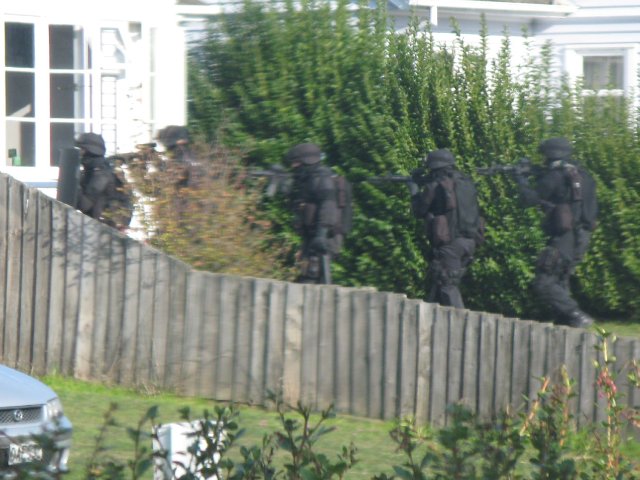I have no idea how many houses I've inhabited over the years -- or how many neighbours I've had. It has to be said, however, that my bad neighbours have tended to be more memorable (and more numerous) than the good ones.
My flatting career began in Auckland. I rented a place downstairs from a bloke who referred to himself as 'Tristram of Parnell'. As in: "The person who used to live in your flat invited me over for a cup of tea, but I told her, 'Tristram of Parnell only drinks espresso.' "
In the manner of all people who inhabit upstairs flats, Tristram of Parnell liked to do his hoovering at one o'clock in the morning -- accompanied by loud singing. He was a devotee of Welsh pop music and his preference was for a cappella versions of It's Not Unusual and Delilah. When not hoovering, he liked to invite his "lady friends" to visit, and would get them in the mood by playing Shirley Bassey records at window-rattling volume.
On weekends, Tristram of Parnell would often "go out for shots". I'd be at home enjoying a Welsh-pop-music-free evening, when he would return in a state of extreme uninhibitedness. So uninhibited, in fact, that he'd often spurn the use of his lavatorial facilities, and instead balance on his verandah rail -- sending a vast yellow torrent in a cascade past my bedroom window. I would lie in bed, praying for him to fall off the verandah, which was on the third storey. Tragically he never did.
My next place of residence was in Laingholm, where I'd landed a gig as a dog-sitter in a rather nice house. The dog's mistress was overseas, and -- because I worked during the day -- it had been arranged that a retired neighbour, Frida, would take the dog for a walk at lunchtimes. I had my first inkling that something was amiss when Frida encountered my then-girlfriend's grandmother. "And you must be David's dear wife," Frida said. She seemed genuinely astonished at the grandmother's denial.
Before long, Frida had started rearranging the furniture during her lunchtime visits. "The dog didn't like that chair in your bedroom, dear, so I've moved it to the kitchen," she'd tell me. The dog also encouraged her to push the sitting-room sofa into the dining room, and to re-locate my dental floss from the windowsill of the bathroom to the medicine cabinet. "We were worried that it was dangerous," said Frida. "An animal could strangle themselves with it, couldn't they, dear?"
On one occasion, Frida invited me to her house for afternoon tea. She owned a number of tiny dogs, several cats, and an aviary filled with semi-moulted birds. "And I've just bought this lovely big monkey," she said, gesturing to a child's toy gorilla. "But the shop had his hands all wrong, so I cut them off and sewed on some rubber gloves instead. Then I realized that his face wasn't proper, so I sliced it open and made him a lovely red mouth with a nice big tongue. I like to see an animal's tongue, don't you, dear?"
The finished monkey would have sent any child screaming from the room; it was like something from Hitchcock. Frida directed my attention to one of the yapping dogs: "That's poor Pepys over there. He's a lovely animal. But he's not as lively as he used to be, and I think I'm going to have to do something."
The next evening, Frida popped round to break the news to me. "I was quite right about Pepys, dear," she said cheerfully. "He had no enthusiasm this morning at all and I had to deal with him. I've buried him just outside the back door, with his nose sticking out the ground -- so I can give it a pat whenever I go past."
Frankly, you might think having a canicidal maniac as a neighbour was as much as anyone deserves in a lifetime. But when I moved to the South Island, I began to look back on Frida as one of the saner people that I've dwelt beside. After all, in spite of her many idiosyncrasies, she certainly made it easier for me to hoover under the furniture.
In Christchurch, I had a neighbour who wanted all communication with the outside world directed through his lawyers. He had a nice friendly sign on his front door: "Do not knock: hostile reception assured." On the opposite boundary, I had a neighbour who, out of nowhere, suddenly accused me of dobbing him in to CYFS. He later apologized, when he discovered that the complaint had been made -- and I'm not making this up -- by his "evil twin brother".
Across the road was a family who resolved their domestic disputes via the tried-and-tested method of having fist-fights on their front lawn. Next to them was a very queer woman, who wandered over to our house as I was hanging out the washing one day. After staring wordlessly at me for several minutes, she asked: "Is your wife sick in hospital or something?" As it happened, Jennifer was sick in hospital, and I asked the neighbour how she knew.
"Didn't know -- but glad to hear it," said my lovely neighbour. "I don't think much of men who do women's work."
A few days later, I was again doing women's work at the washing line, when I heard the sound of breaking branches from over the fence. One of the trees was waving madly. I watched with interest as a man wearing a black balaclava climbed into the bole, and proceeded to train a Bushmaster M4A3 into my lovely neighbour's house.
I gradually became aware of dozens of black-clad figures climbing over fences, and scampering along the street. It was quite disconcerting to be the only person within eyesight who wasn't wearing a ballistic vest and helmet. Shouldn't a responsible adult be telling me to go inside, I wondered.
Eventually, the policemen formed a sort of conga line and battered down my lovely neighbour's front door. She was dragged out in handcuffs. I never discovered what she'd done, but I suppose that crimes against feminism must be fairly high on the list of possibilities.
Above: A neighbour is brought to justice.
I know, of course, what people will be thinking at this point: he's bringing it on himself. But this is not true, I swear. My relations with all my neighbours have been entirely cordial -- right up to the point where they were arrested, or when they contracted a life-threatening disease from a duck that I'd allegedly "encouraged", or when they suddenly accused me of spying on them for the government.
A case in point was our residence in Southland. Given that the house was located in an area where 98 per cent of the dwellings were uninhabited during the week, I had assumed that we would be safe from neighbours. Not so -- it turned out that we had inadvertently moved next door to the town drunk.
The pounding music would begin shortly after he had returned from the bottle store. This would be followed by incoherent shouted arguments (presumably with himself), and the evening would end with the unmusical tinkle of beer bottles being hurled off his back balcony, and smashing against the corrugated-steel fence.
A low point in my experience with neighbours was reached about 1.30 am one morning, when he began to repetitiously scream the following refrain: "I'm wanna get my hands on some sixteen-year-old pussy!" There is an innocent interpretation of these words, but I'm not sure I'd believe it.
It was with some trepidation, therefore, that we moved into our current house, which shares a boundary with six other properties. On our first weekend, in an attempt at pre-emptive friendliness, we invited our new neighbours for afternoon tea.
They seemed like a nice bunch. I was particularly impressed by Ron, a retired gentleman who'd lived in the area since childhood. He held us spellbound with his blood-curdling recollections of previous occupants of our houses.
I suppose that the structure of Ron's anecdotes could be expressed mathematically with the formula: x, of course y. Where x is an event seemingly unrelated to y; and y is an event that results in death.
For example: "Well, they told Mrs Johnstone from Number 340 that she had to have a hysterectomy. Then, of course, the Huntingdon's disease got her." And: "Mr Briers from Number 330 was one of the first contractors in Canterbury to get a self-powered hay-baler. Of course, he didn't come home one day, and his wife found him sliced up inside one of the bales -- dead as a doornail." Or: "Mr Riley from Number 328 was a lovely man. He had the idea that he'd store his lawnmower by hanging it in his garage roof. Of course, somehow he managed to start it as he was taking it down. Well, I'll give you an idea of how bad it was: the undertaker fainted when he saw the bits and pieces that were left over."
At this point in proceedings, possibly carried away by his own oratory, Ron also fainted -- dramatically crashing across our table, and reducing it to matchwood. Fortunately, one of the neighbours was a nurse. It has to be said, however, that her revival of Ron to semi-consciousness (in conjunction with the bandaging of his wounds and the mopping-up of his blood) did have a slightly depressing effect on the party atmosphere.
All-in-all, though, and particularly in comparison with previous neighbours, I considered the afternoon to have been a raging triumph. I only hope that cordial neighbourhood relations can be maintained into the future.

